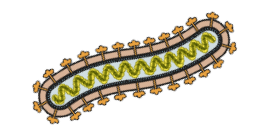

Acute infections caused by viruses such as Ebolavirus are characterized by rapid production of infectious virus particles, followed by resolution and elimination of infection by the host. However, chronic symptoms may persist for a long time after the infection is cleared. There have been long-term health consequences identified in survivors of previous Ebolavirus outbreaks. These include joint and muscle pain, vision and hearing loss, abdominal pain, bleeding, malaise, and psychological problems. Some patients were unable to perform their previous jobs for up to one year.
The long term health consequences of infection was studied in detail for the 2007 outbreak of Bundibugyo ebolavirus in Uganda. Survivors (49) were contacted 29 months after the outbreak and provided information about health status and their ability to function, and blood samples were obtained for further study. Controls for the study were seronegative contacts.
The results show that survivors of Bundibugyo ebolavirus infection are at significantly greater risk than controls for long term health problems. These include ocular problems (pain, blurred vision), loss of hearing, sleep difficulty, and joint pain. Other issues are abdominal and back pain, fatigue, impotence, severe headaches, memory problems and confusion. No differences in results of blood analyses were observed between the two groups. This study only included adults; children who have recovered should also be examined as their health care needs may be different.
These results confirm that there are long-term sequelae of Ebolavirus infection. The basis for the complications is not known, but is likely a consequence of tissue damage due to viral replication and the immune response. Whether or not virus was present in the patients was not determined. However it is known that Ebolavirus can persist in the testicles and eye long after it is absent from serum.
Other serious viral infections are also accompanied by long term health effects. For example, 29% of Lassa virus survivors have hearing loss, while joint pain persists for 3-5 years in about 10% of those infected with chikungunya virus.
Ebolavirus is a highly lethal virus, and those who survive infection are fortunate. Despite recovering, their health problems are not over. The size of the recent outbreak provided impetus for clinical trials of vaccines and antivirals; now research is needed to determine how to best care for the many survivors.
Update: The NIH has announced a study in Liberia to examine the long-term consequences of Ebolavirus infection.

Fascinating discussion but nothing that many people with chronic fatigue syndrome or fibromyalgia whose illness started with an infection wouldn’t immediately recognize. The Dubbo studies indicated that about 10% of people who come down with a wide variety of infections from bacterial to viral either don’t fully recover (get ME/CFS/FM) or take a long time to recover. The only risk factors for lingering illness that emerged in followup studies was the severity of the initial illness…..
It’s amazing how our medical system disregards these people for whom an infection, whether Ebola or not, turns out to be a life-changing event.
Millions of us have seen their lives shattered by whatever ailed us most of us had a viral infection. There has been clusters both in Lake Tahoe and in upstate NewYork in the mid 1980’s. The CDC named it chronic fatigue syndrome because it couldn’t be that bad, could it? These people from the epidemic sites are either dead, or still sick.
Us the patients sick with post viral illness have suffered from enormous stigma and neglect from governments who refused to fund adequate research.
And here we are today where Ebola survivors are reporting the very same symptoms than we patients with ME have, which deserve attention and further epidemiological studies?
I would like to tell the researchers, please consider comparing the post ebola patients to patients with ME. Consider giving anti virals to all post viral illness patients and consider speaking to Pharma about the urgent need for drug development for at least 17 millions of patients around the world, some of which are too sick to even feed the,selves or look up a phome screen. Most of us are unable to work, still have sore lymph nodes and sore throats years after the infection have come and gone.
I predicted myself there would be a post-ebola syndrome following the large epidemic.
It is very hurtful for those of us who have long been left behind by our health care system to see that once more all the attention is towards ‘the most sexy diseases’.
Pingback: Long-term effects of Ebolavirus infection | Too...
Great article. I’m glad to see that although this is no longer news in mainstream, this virus that afflicted almost 30,000 people is not out of mind. Follow up of the health of survivors is an integral part of understanding the virus.